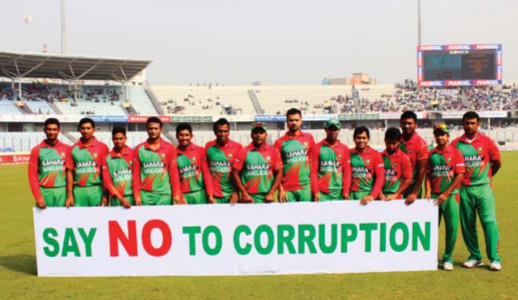Published: 23 February 2016
 At the backdrop of incidences of match-fixing, political and commercial influences in arranging major events, the lack of good governance in administration and other risks of corruption in international sports, Transparency International Bangladesh (TIB) today urged the Government to take necessary preventive measures to maintain clean image of cricket in Bangladesh. Releasing the ‘Global Corruption Report: Sport’ of Berlin-based Transparency International (TI), through a press conference in its Dhanmondi office this morning, TIB's Executive Director Dr. Iftekharuzzaman underscored the need for enacting necessary laws for ensuring transparency in the Bangladesh's cricket's governance. He also hoped that all stakeholders involved with cricket matches and tournaments should comply with International Cricket Council’s (ICC) anti corruption rules to avoid incidences of tainted images in the future. TIB's Deputy Executive Director Professor Dr. Sumaiya Khair, Director-Research and Policy Mohammad Rafiqul Hassan and Deputy Programme Manager-Research and Policy Mohammad Nure Alam were also present among others during the press conference. Dr. Zaman, Mr. Alam and Rumana Sharmin are the co-authors of ‘Cricket in Bangladesh: Challenges of governance and match-fixing’ incorporated in TI’s GCR-Sport.
At the backdrop of incidences of match-fixing, political and commercial influences in arranging major events, the lack of good governance in administration and other risks of corruption in international sports, Transparency International Bangladesh (TIB) today urged the Government to take necessary preventive measures to maintain clean image of cricket in Bangladesh. Releasing the ‘Global Corruption Report: Sport’ of Berlin-based Transparency International (TI), through a press conference in its Dhanmondi office this morning, TIB's Executive Director Dr. Iftekharuzzaman underscored the need for enacting necessary laws for ensuring transparency in the Bangladesh's cricket's governance. He also hoped that all stakeholders involved with cricket matches and tournaments should comply with International Cricket Council’s (ICC) anti corruption rules to avoid incidences of tainted images in the future. TIB's Deputy Executive Director Professor Dr. Sumaiya Khair, Director-Research and Policy Mohammad Rafiqul Hassan and Deputy Programme Manager-Research and Policy Mohammad Nure Alam were also present among others during the press conference. Dr. Zaman, Mr. Alam and Rumana Sharmin are the co-authors of ‘Cricket in Bangladesh: Challenges of governance and match-fixing’ incorporated in TI’s GCR-Sport.
The Bangladesh report highlighted illegal activities of betting operators; punishment of a young cricketer and involvement of an umpire in match-fixing; a club’s role in match-fixing in Bangladesh Premier League and various governance challenges Bangladesh Cricket Board’s (BCB). Observing that there is no specific law in Bangladesh to deal with sports-related corruption, Dr. Zaman urged for formulating a long-term anti-corruption strategy to strengthen BCB’s Anti-Corruption Unit (ACU).  TIB also urged to set up an independent and specialized Office of Ombudsman for Cricket.
TIB also urged to set up an independent and specialized Office of Ombudsman for Cricket.
It may be mentioned here that TIB has been advocating with BCB to address governance challenges in Bangladesh's cricket since 2014. With BCB's endorsement, Bangladesh's National Cricket Team joined a TIB-led ‘Say NO to Corruption’ campaign on the eve of the International Anti-corruption Day 2014. In January same year, TIB lodged strong protest against International Cricket Council’s (ICC) attempt to establish two-tier system of test matches and money driven control mechanism.
The GCR Sport put forward some specific recommendations to initiate fundamental reforms to overcome governance challenges in Bangladesh cricket. These included, among others:
the recruitment of skilled human resources, enhancing technical capacity, independence, professionalism and effectiveness of the ACU, creating legal provisions to effectively prevent match-fixing, spot-fixing and any other forms of cheating; and the oversight by the Parliamentary Standing Committee for ensuring good governance of the cricket management and administration of BCB.
ACU should function as unit of integrity and anti-corruption, consistent with the Governmnet's National Integrety Strategy (NIS), TIB observed, adding that all stakeholders involved in cricket matches and tournaments, especially the franchises, managers, coaches, captains, players and media houses, whether national or international, should formally sign an agreement to uphold the ICC’s Anti-Corruption Code. Individuals involved with BCB and their immediate family members, agents and gate-keepers should be subjected to the proactive disclosure of their income and wealth, TIB said. It also urged for taking specific programmes on information, education and communication to change the behavior of young cricketers.
The GCR Sport revealed corruption not only in football but also in cricket, cycling, badminton, ice hockey, handball, athletics and other sports. The GCR includes 60 articles from a broad range of contributors, including the International Olympic Committee, players’ organisations, and athletes past and present supporters groups and academics.







